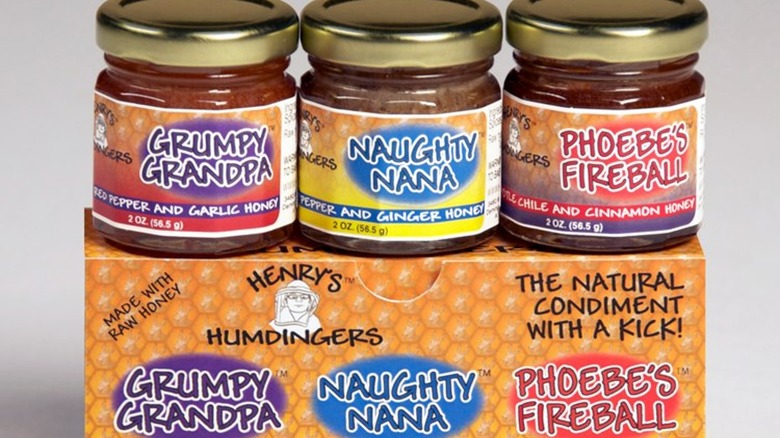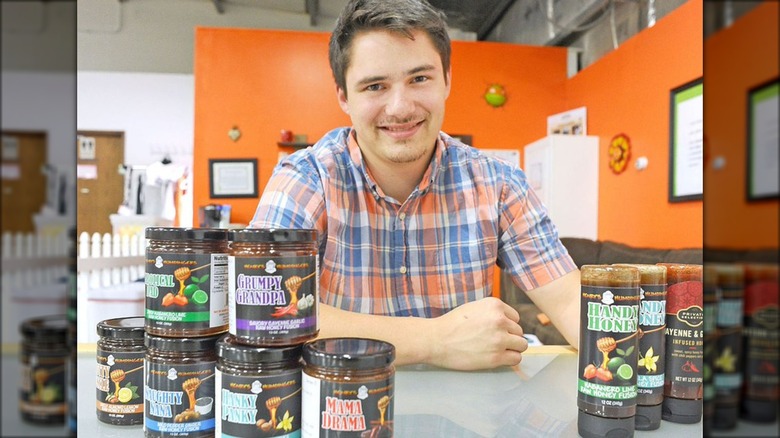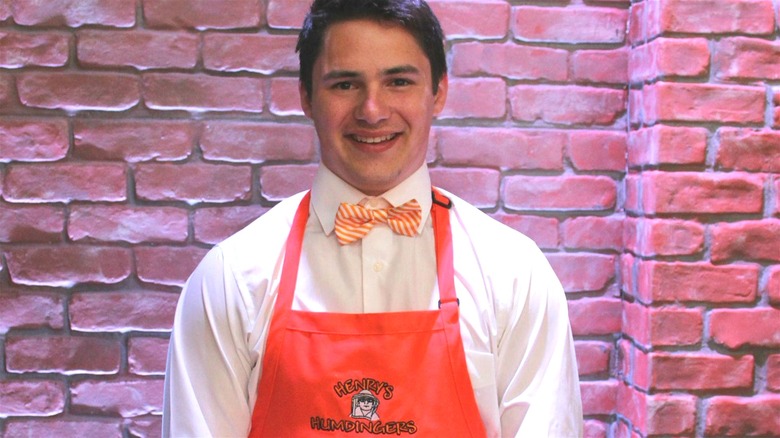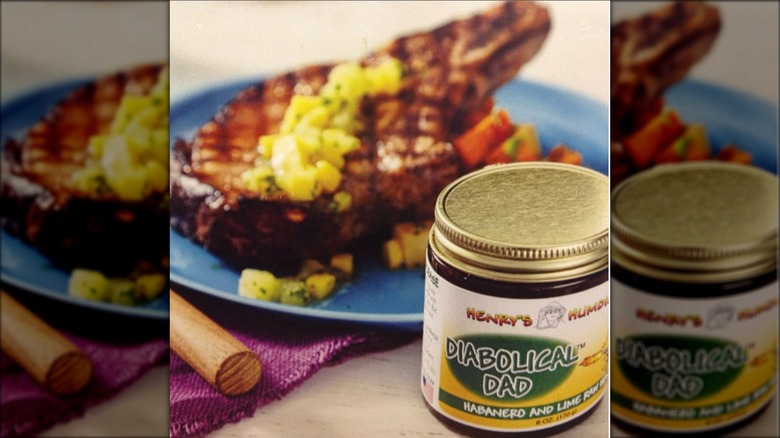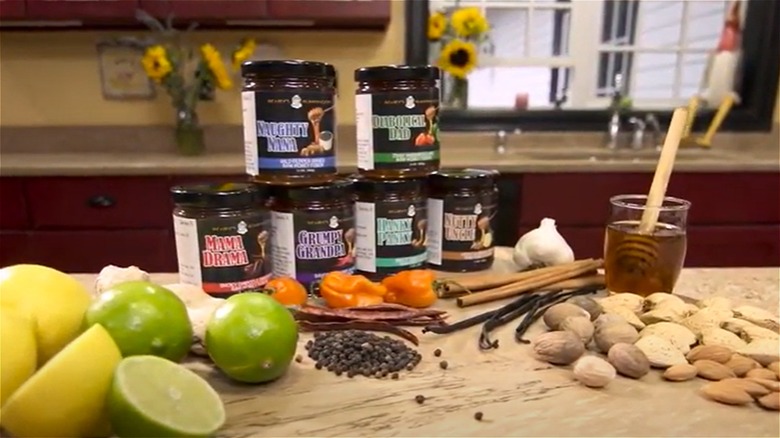What Happened To Henry's Humdingers After Shark Tank?
Henry's Humdingers received considerable buzz from the popular television show "Shark Tank" when owner Henry Miller appeared before the judges in a beekeeper's suit. Although he wore a business suit underneath, Miller was a beekeeper through and through. He first capitalized on his bee colonies by asking his parents for a beekeeper's box as a gift for his 12th birthday. From the start, the young entrepreneur had big dreams for his honeybees, turning his hobby into an eco-friendly mission. With a hive of his own, he set out to fight colony collapse disorder, a phenomenon in which worker bees abruptly disappear. Miller soon found himself in a sticky situation, harvesting much more honey than he anticipated. So he decided to infuse it with a few interesting flavors, sell it, and donate the proceeds to The Foundation for The Preservation of Honey Bees. You've got to hand it to him. Out of all the types of honey available, Miller's was overflowing with heart.
Miller created unique flavors like Spicy Pepper, Ginger Raw Honey, and Habanero Lime Raw Honey. Yet, not every flavor was a hit. According to Henry's mother, Denise, a wasabi-flavored honey with an unappetizing consistency was not a hit. While Miller and his mother focused on product development, his dad traveled to trade shows to share the raw, spicy honey with the world.
What happened to Henry's Humdingers on Shark Tank?
Intrigued by Henry Miller's successful beginnings and spicy-sweet concoctions, "Shark Tank" caught wind of Henry's Humdingers in 2014. When Miller pitched the investors, her initially asked for a $150,000 investment in exchange for a 25% stake. He appealed to the judges, explaining there were dire consequences in store because of the dwindling bee populations. Miller was commended for his tasty honey flavors and that in three years, he made $67,000. $50,000 of that sum was earned just 12 months before his "Shark Tank" appearance. The Sharks also appreciated that Henry's Humdingers had hit shelves in 300 stores across 30 states and had already partnered with Wegmans.
Before diving in, the judges put Miller through his paces. Sharks Kevin O'Leary and Lori Greiner questioned whether a market even existed for hot honey and opted out. Mark Cuban needed more information about the marketing strategy. Ultimately, Robert Herjavec said the value offered wasn't worth the investment. Herjavec increased the offer to $300,000 for a 75% investment and sealed the deal with Miller.
After reaching a deal with Robert Herjavec, Henry Miller decided to reject the offer after all. Instead of taking the risk of landing his start-up on the list of Shark Tank food flops, he elected to keep the business in his family, even though he could have instantly paid off his parents' $150,000 investment. Confident in his decision, Miller continued to push his business.
Henry's Humdingers after Shark Tank
After the episode aired, Henry's Humdingers experienced a 300% increase in growth, much of which came from online sales spurred by the so-called "Shark Tank" effect. In June 2015, a QVC segment featured Henry Miller's raw honey and introduced new flavors to viewers. He also made an appearance on the Home Shopping Network.
Miller explained that when he initially accepted Herjavec's offer, it sounded like a lot of money to him at such a young age, and he was eager to strike a sweet deal with one of the Sharks. In the end, they couldn't reach an agreement on outsourcing options, but Miller said he had no regrets moving forward. The rejection stemmed from a careful, business-savvy decision based on previous experience with untrustworthy partners who sought to take advantage of "over-trusting individuals" who were new to the industry (per Zen Business).
Despite turning down the "Shark Tank" opportunity, the young entrepreneur tried in earnest to craft and market the best honey he could dream up. At one point, the young CEO and founder even had his own cookbook. In a podcast interview in 2016, he mentioned that Mark Cuban's advice about needing to tap into a larger market for spicy honey products resonated with him, so he decided to take the reigns with the company's small budget. Miller then traveled to Cincinnati and landed a deal with Kroger to build a more trustworthy brand.
Why did Henry's Humdingers go out of business?
Sometimes, the unexpected happens, derailing our plans and forcing us to put our hard-earned progress and life goals on hold, which is exactly why Henry's Humdingers went out of business. The company operated for about five years until Miller announced on Facebook in 2019 that he was forced to shut the company down due to sudden and unexpected circumstances, mentioning that it hadn't made any profits in a while. In the post, he revealed that not only was his mother recovering from cancer, but his family had also tragically lost their home and most of their possessions in a fire. Miller graciously thanked everybody for their support and added, "As corny as it sounds — we have each other, and I was able to raise awareness for the bees."
The millennial entrepreneur linked a GoFundMe page to the company's official Instagram account, disclosing the heart-wrenching details of the events. We're happy to report that the site raised over $50,000 to help his family rebuild their lives. Despite these hardships, Miller hasn't lost his entrepreneurial spirit. After Henry's Humdingers closed shop, Miller focused on his university studies and had to get rid of his hives. With Washington State University on the opposite side of the state from his hometown in Deming, there was no way he could realistically tend to them.
What's next for Henry's Humdingers?
Now a graduate of Washington State University, Henry Miller still enjoys facing challenges that arise in the business world. On his LinkedIn page, Miller's bio states people should believe in their ideas "even when you're the youngest person in the room with the least amount of experience, daring to be different." He still has his title of founder and CEO of Henry's Humdingers listed on his public profile and has mentioned in previous interviews that he hopes that his family business can one day break into the food industry and turn his honey into a restaurant-worthy condiment. This would be a great option, considering that there are many tasty ways to use hot honey.
The closure of Henry's Humdingers may be a temporary pause. After all, Miller was quite young when he appeared on "Shark Tank." Currently, he's navigating his early 20s, blazing a trail into adulthood. He should be proud that he already possesses more business experience than many people his age could dream of having. Perhaps one day, he'll take up the torch once again and reclaim his original mission to save the bees.
